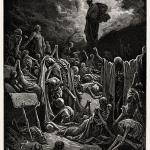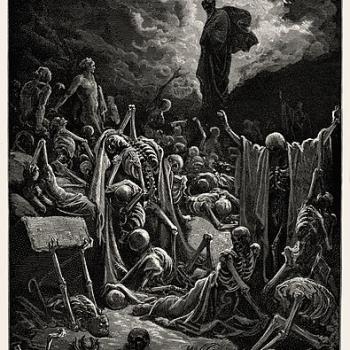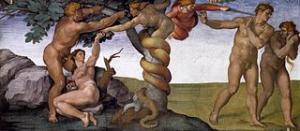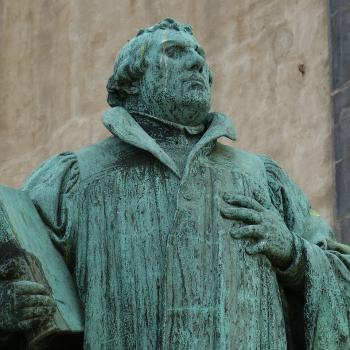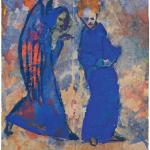
Anyone who belongs to a liturgical Christian tradition (and perhaps many who don’t) has heard Psalm 22 a lot in the past week. So I decided to share publicly a translation of the Psalm that I made some months ago as part of my ongoing project of reading through the Bible in Hebrew. I was so struck by the imagery of this well-known Psalm in particular that I wanted to try my hand at translating it myself. This is not a scholarly translation–I am not an expert in Hebrew and I’m sure Hebrew scholars will find much to criticize in my choices. It’s an attempt to render the meaning of the Psalm as I perceived it while working through the Hebrew text.
One of the things that struck me about the Psalm when doing a close reading in this way was the way the imagery hangs together to paint a coherent picture. Because of the Psalm’s liturgical use, I think we as Christians often read it and think primarily of the crucifixion of Jesus. But the central image, in vv. 12-21 is of a man being attacked by a series of wild animals: first bulls who toss him on their horns, then a lion who pulls his bones apart, and then a pack of dogs, who rip his clothing off and chew on his hands and feet. At this stage, one would expect the person to be long dead. The dogs are chewing on his hands and feet because all the good parts have already been eaten (probably by the lion).
But the story doesn’t end there. In v. 19, at the point where he’s apparently little more than a pile of dismembered bones, the sufferer calls out to God for deliverance, and the sequence of animal attacks is mentioned in reverse order–dogs, lions, bulls. This is the “chiastic” pattern typical of Hebrew poetry and a lot of NT narratives as well: abccba, with the desperate cry to God sandwiched in the middle. It’s as if the film runs backwards and God undoes the destruction that, it would seem, has already happened.
And of course that’s where we can see a connection with the Christian application of the story to Jesus. This is a Psalm in which the worst happens and then is undone. As so often with “prophetic” interpretations of Scripture, we actually wind up with a deeper spiritual meaning when we actually hold off on the Christological moves and let the text speak to us first in its original context.
I’ve spent much of my life studying and defending traditional Christological interpretations of Scripture, including the much-reviled Christological reading of the Good Samaritan. I’m not going to stop doing that. But I think we can have it both ways. We can read a text like this “on its own terms” as describing something many people have experienced throughout history–rejection, persecution, horrific violence–and precisely for that reason apply it to Jesus. Jesus takes on himself all the suffering and rejection and abuse that humans have dealt out to each other over the millennia. His story is our story.
Far too often, around Eastertime, a “conservative” emphasis on the atoning nature of Jesus’ death and a “progressive” emphasis on Jesus’ death as an act of solidarity with all victims get posed over against each other as alternatives. I don’t think they are mutually exclusive. I think they enrich each other and neither can be fully meaningful without the other.
A final linguistic note: one of my wackier translation choices is “insect” instead of “worm” for תוֹלַ֣עַת in verse 6. I know that the word is often used to mean “worm.” But its most specific meaning seems to be to refer to the insect “kermes ilicis” from which ancient people (particularly the Phoenicians) made a crimson dye. The insect looks like a worm in part of its life cycle, so “worm” may be a better choice on the whole. But since it’s also become a rather cliched and loaded term in this context, I thought it would be fun to go for “insect” instead here. This is the sort of thing one can do when one is not putting one’s translation forward as anything but a personal response to the powerful imagery of the Biblical text.
And now here’s the translation itself:
Psalm 22
My God, my God, why have you abandoned me?
Far from my shout, from the words I groan.
My God, I call to you by day, but you do not answer,
There is no silence for me in the night.
But you are holy,
Dwelling in Israel’s praises;
On you our fathers trusted,
They trusted, and you delivered them.
They cried out to you, and they were rescued;
On you they trusted, and they were not shamed.
But I am an insect, not a man,
A disgrace to humanity, and the people despise me.
Everyone who sees me mocks me,
Their lips curl, their heads shake.
“He trusted in YHWH, let him deliver him,
Let him snatch him up, if he is pleased with him.”
For you took me from the womb,
You made me rest trustfully on my mother’s breasts.
On you I was thrown from the womb;
From my mother’s belly you have been my God.
Do not be far from me, for affliction is near;
For there is no helper.
Many bulls circle round me;
The mighty of Bashan surround me;
The bulls bare their teeth at me;
A roaring lion gashes me.
My blood pours out like water;
My bones are pulled apart;
My heart becomes like wax,
And melts within my chest.
My strength dries up like fired clay,
My parched tongue sticks to my jaw,
In the dust of death you have laid me.
Now the dogs surround me,
An evil pack bounds about me,
They sink their teeth into my hands and feet.
I can count every one of my bones,
As the dogs stare and gaze at me.
They have already pulled my clothes apart,
And each one has a bit of my garments.
So you, YHWH, do not stay far away.
Make haste, my strength and my helper.
Snatch my life away from the sword,
Save my one and only life from the dog’s paws.
Save me from the lion’s mouth!
You have already answered me when I was on the wild bulls’ horns.
I will tell your name to my brothers,
I will praise you in the assembly.
All you who fear YHWH, praise him;
Give him glory, all the seed of Jacob.
Tremble before him, all the seed of Israel.
For he has not despised the poor man or looked on his poverty with disgust,
And he has not turned his face from him,
But he heard the poor man shouting to him.
It is you I will praise in the great assembly,
And I will pay back what I have vowed before those who fear YHWH.
The poor will eat and be satisfied,
And those who seek for YHWH will praise him.
May your heart, O poor, live for ever.
They, will remember YHWH and return to him,
All the ends of the earth.
And all the tribes of the nations will worship before his face.
For the kingdom belongs to YHWH,
And he will rule over the nations.
All the fat ones of the earth will eat and worship,
All who go down to the dust will bow before his face.
For none of them can keep his soul alive.
A seed will serve YHWH,
It will be counted as the Lord’s generation.
They will come and tell his justice,
Tell the newborn people what he has done.
Photo by ARTISTIC FRAMES on Unsplash


